Starting your own business can be scary but also super cool. How you set up your business affects many parts of it and also affects you personally—in terms of how much personal liability you have in the business, what regulations you have to follow, how bookkeeping will be done, and how income tax will be paid.
That’s why many small business owners form their business as an LLC. Here, we will cover why some companies should be LLCs, how to set up bookkeeping for an LLC, and how taxes work with this business entity.
Why should some businesses be LLCs?
An LLC is not just a business structure; it’s a symbol of versatility and flexibility. It has elements of sole proprietorships, partnerships, and corporations, so it’s the ideal business model that can thrive in any business condition. The most flexible business structure encourages small business owners to try new things and strategies.
Registering your business as a limited liability company (LLC) has many advantages. You can file the LLC’s income tax as a sole owner or corporation, have liability protection for your personal assets from court judgments and debts, and are subject to fewer regulations. This flexibility and protection makes LLCs a popular choice for small business owners. However, LLC members must pay self-employment tax on their personal income tax returns.
How do you set up your business as an LLC?
Setting up your limited liability company (LLC) business involves several steps. First, you must register your business name with the state to establish your business as an LLC. Then, you’ll need to create an operating agreement.
This operating agreement outlines your business operations, who is affected by the business operations, and the procedures if you close the business. Once you’ve done these steps, you’ll be issued a certificate of operation, which includes your tax ID number, which will be used for tax purposes and opening a business account.
Once you file with the state, you’ll get a Certificate of Operation. The Certificate will include your tax ID number, which you will use for tax purposes and to open a business account.
Should I keep my personal and business finances separate?
Keeping your personal and business finances separate is a must. Having a business checking account separate from your personal funds is crucial for managing all your personal and business transactions.
This separation will have all your income and expense transactions in one place, making it much easier to calculate your business’s tax obligations, especially small business tax deductions. Intermingling personal finances with business finances can lead to IRS problems. Companies with employees also have to pay employment tax, including Social Security and Medicare contributions.
Types of accounts
Small businesses can have many accounts, including separate checking, savings, and credit card accounts.
Small business owners should have business checking and savings accounts. The checking account is used to receive customer payments and pay expenses; the business savings account saves a percentage of income for tax obligations and unexpected business expenses.
Which accounting method should I choose?
The LLC must use one of two accounting methods: cash or accrual.
1. Cash accounting method
The cash method deducts expenses when paid, and cash is accounted for when received. This is the most popular accounting method among small businesses because of its simplicity.
2. Accrual accounting method
The accrual method records business expenses when the product or service is received and income when the sale is made. So it gives a more accurate picture of your business’s revenue and costs.
The cash method isn’t as precise as the accrual method but allows you to defer taxes until you have the funds.
How can I simplify my LLC accounting?
LLC bookkeeping can be simplified using software or an outsourced service for expense management. This involves scanning receipts into digital data with automatic data extraction for reimbursements, expense reporting, and tax preparation.
Shoeboxed
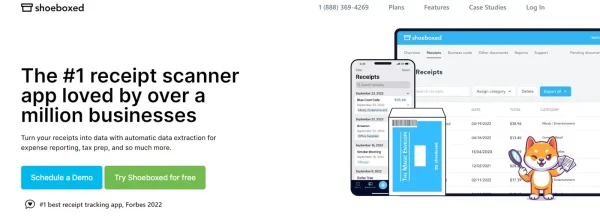
Shoeboxed is a game changer for LLC bookkeeping. The platform makes financial management more accurate and efficient.
Digitizes receipts and documents
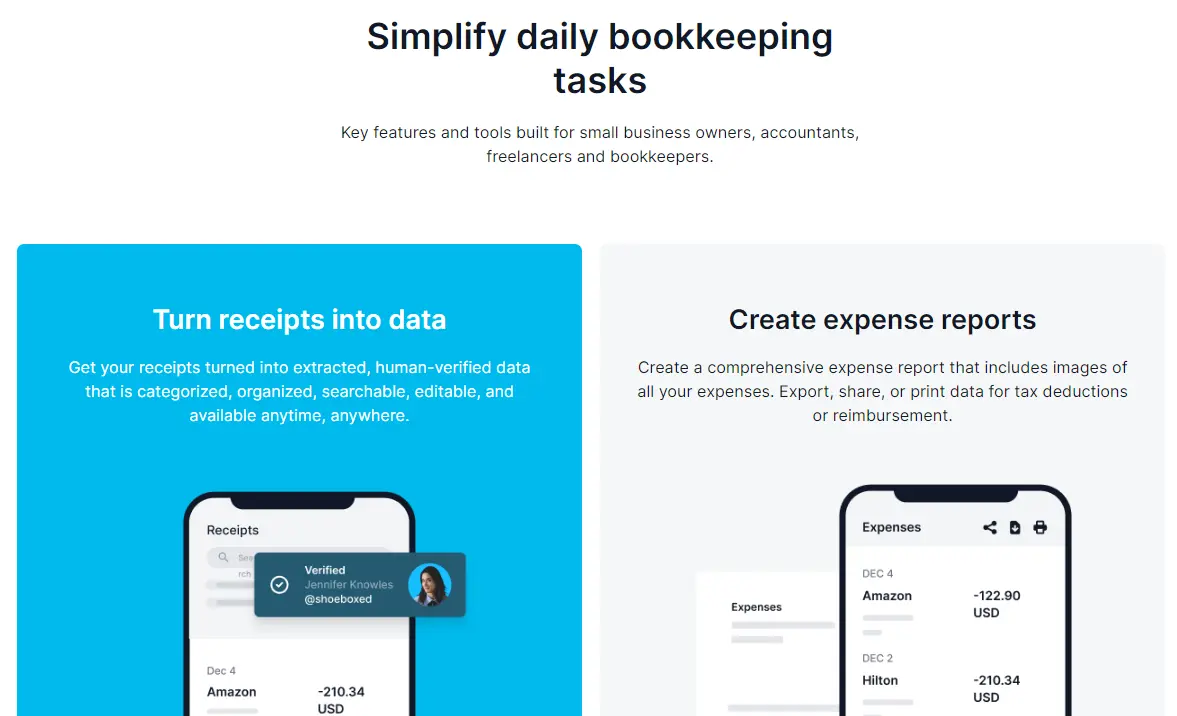
LLCs generate many receipts and documents with all their expenses and paperwork.
Digitizing receipts and documents reduces paper clutter and manual entry and makes the records more accessible.
Shoeboxed extracts critical information from receipts using OCR technology; no more manual data entry.
Mobile app
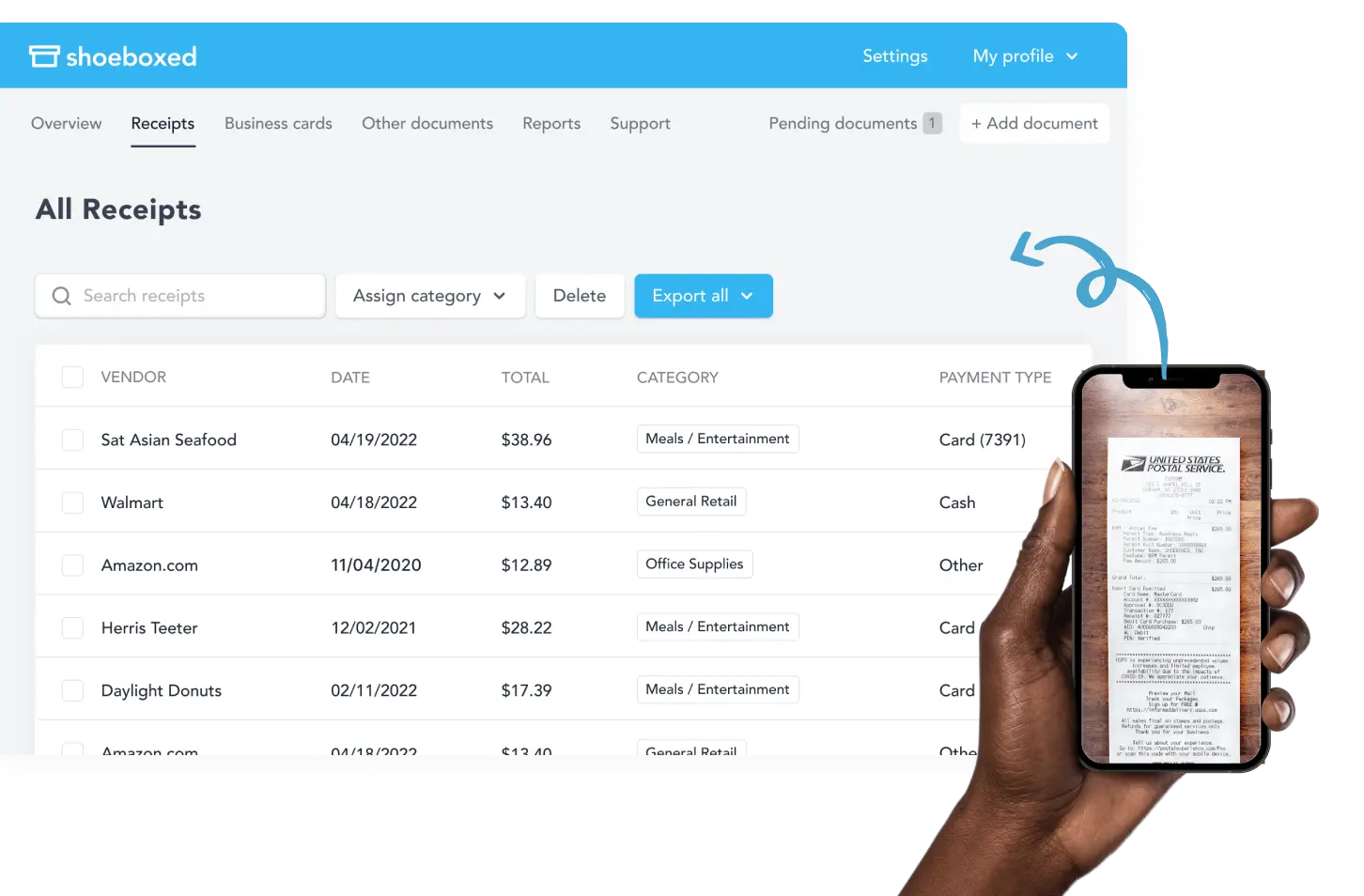
More LLC professionals are going mobile. You can take photos of receipts using your mobile device and Shoeboxed’s app to upload receipts and documents to your Shoeboxed account.
Shoeboxed is a cloud-based accounting software. All receipts and documents are stored in the cloud, so you can access them anywhere and never lose necessary paperwork.
Receipts and documents become part of a searchable database so you can retrieve information quickly when needed.
Magic Envelope
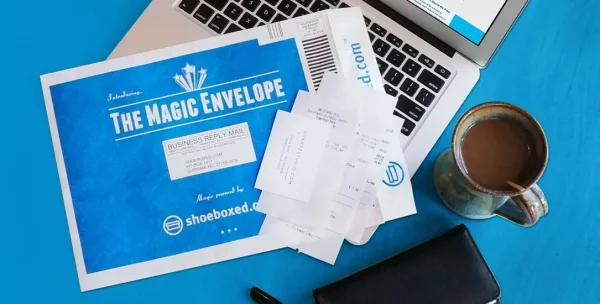
If you want to outsource receipt and document management, Shoeboxed offers a free postage-paid Magic Envelope you can fill with receipts and mail to their processing center to scan, human-verify, and upload into your account.
To save time in processing, you can send batches of receipts in a pre-paid Shoeboxed envelope for scanning and digitization.
Shoeboxed is the only receipt scanner app that will handle both your paper receipts and your digital receipts—saving customers up to 9.2 hours per week from manual data entry!
A Bookkeeper’s Best Friend ✨
Professional bookkeepers use Shoeboxed’s scanning service to scan receipts and stay on top of client accounts. Try free for 30 days!
Get Started TodayOrganizes and categorizes
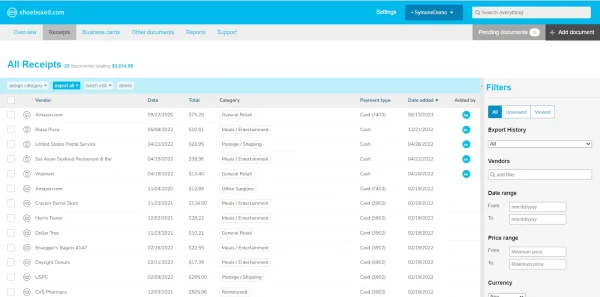
Once uploaded, Shoeboxed categorizes and organizes the scanned receipts.
Shoeboxed categorizes expenses into tax or custom categories, such as marketing, transportation, office supplies, and more, so LLCs can better track their spending and manage their budgets.
You can create custom tags and categories to suit your LLC’s bookkeeping needs and have tailored financial oversight.
This auto-categorization saves you time and reduces errors.
Expense reports
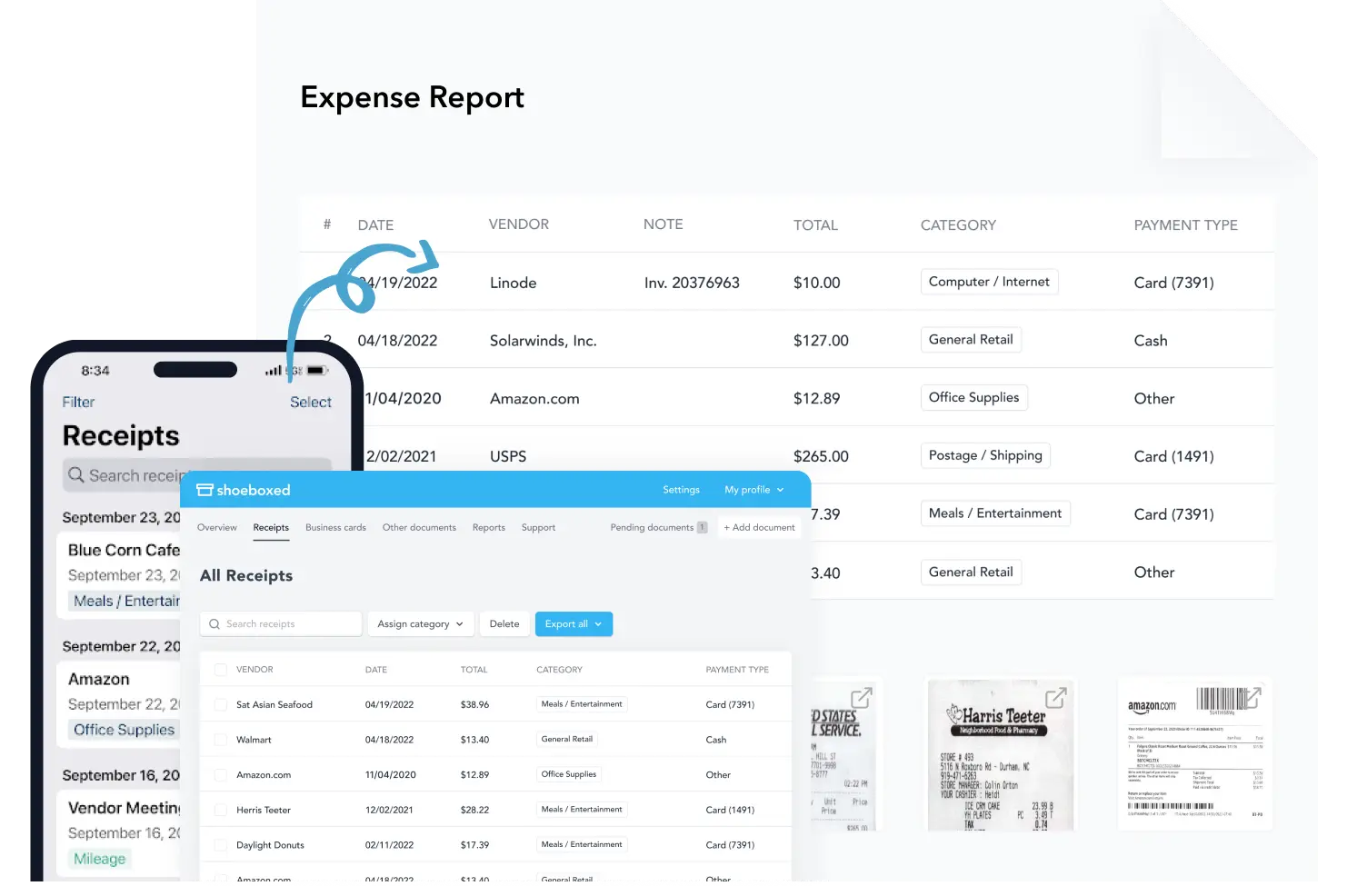
Shoeboxed generates reports for reimbursements, expense reports, and tax deductions with one click.
Detailed expense reports show spending patterns and financial accounts and help LLCs with budgeting, financial planning, and analysis.
Integrates with accounting software
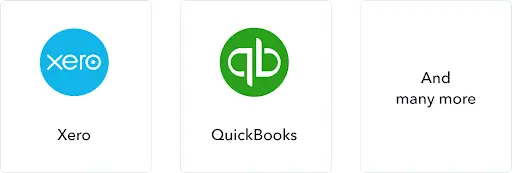
Another great feature for LLCs is that it integrates with accounting software like QuickBooks and Xero for easy data transfer and sync.
IRS-accepted
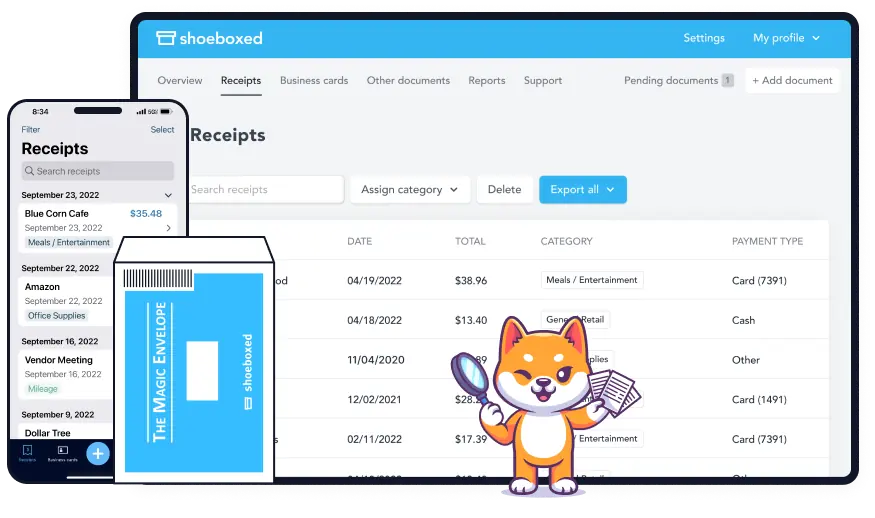
Receipts are stored in IRS-accepted format with Shoeboxed so tax preparation is smoother and more audit-proof.
Shoeboxed tracks deductible expenses like mileage, office supplies, etc., so you can maximize tax deductions.
It generates tax-friendly reports of deductible expenses to make tax filing easier.
Turn receipts into data for tax time ✨
Try Shoeboxed’s systematic award-winning approach to receipt tracking for tax season. Try free for 30 days!
Get Started TodayMileage tracking
Shoeboxed has a mileage tracking feature that logs business trips so you can claim mileage deductions.
Detailed mileage reports can be generated to track and claim mileage deductions.
Track mileage with Shoeboxed 🚗
Track mileage using your phone’s built-in GPS for unmatched ease and accuracy. 💪🏼 Try free for 30 days!
Get Started TodayEnhanced collaboration
Multiple users can access Shoeboxed so you can collaborate on bookkeeping tasks.
Different levels of access and permissions can be set for different users to protect sensitive financial data.
Scalability
As your LLC grows, Shoeboxed can grow with your business and manage increasing receipts and expenses.
Detailed and accurate financial records can attract investors or partners by showing the profitability and stability of your LLC.
Shoeboxed can benefit LLC bookkeeping by automating receipt management, expense tracking, and financial reporting. This means tax compliance, financial oversight, and time savings. It also means more accurate bookkeeping, better financial management, and a more efficient business.
Shoeboxed demo
Why use a general ledger?
The general ledger is the backbone of your accounting system. It’s a record of all your business’s transactions. These transactions are categorized into equity, revenue, expenses, liabilities, and assets. From these categories you can create your chart of accounts. The general ledger helps you to organize and manage your financial data. It’s used to apply for business loans, balance accounts, and prepare for an audit.
Do I have to record all my transactions?
Yes, you should keep an accurate record so you can track all business transactions. These include income earned, business expenses, and payable tax obligations.
Supporting documents to keep as proof of these transactions are:
Business receipts for expenses such as office supplies or travel expenses
Invoices
Bank statements
Tax returns
Financial statements
Proof of payment
Bills for office utilities, telephone, internet, etc.
How do LLCs handle their taxes?
You need to decide how to set up your accounting and how you want to be taxed.
LLCs with employees must pay employment taxes under the Federal Insurance Contributions Act (FICA), including Social Security and Medicare contributions.
1. Single member LLC
If you are the only owner of the LLC, your business will be taxed as a sole proprietorship. Filing as a Single Member LLC, business profits or losses will pass through to your federal tax return.
You will attach a Schedule C to your 1040 tax form to report business income. Also, a Schedule SE will be attached to report self-employment taxes.
2. Multi-member LLC
If you have multiple owners, you will be considered a partnership. Each owner will pay taxes through their tax return based on their company share. You will attach a Schedule E to your 1040 to report partnership income.
Form 1065 must be filed to show that all LLC members report business income or loss correctly. A Schedule K-1 must also be filed to show each member’s percentage breakdown.
3. Corporation
If an LLC wants to be treated as a corporation, it must file Form 8832 and be taxed. Generally, if its income falls in a higher tax bracket, it may be better to be taxed as a corporation. Regular corporations are taxed at around 21%.
Multi-owner LLCs are taxed twice if they are treated as corporations. The LLC will be taxed at around 21%, and each shareholder will pay taxes on their dividends at a capital gains rate.
Frequently asked questions
Do I need to keep books?
Books and records are crucial for an LLC to run smoothly and succeed. Keeping books is the only way a company can have accurate and realistic financial projections and achieve its goals.
How do I set up bookkeeping for my LLC?
First, choose the accounting method that fits your business, create a chart of accounts, and record all your transactions. These transactions will be categorized and then turned into financial statements.
What accounting method should I use?
LLCs can use either cash or accrual accounting. Cash method is when expenses are deducted when paid and cash is received. Accrual method is when business expenses are recorded when the product or service is received and income when the sale is made.
In conclusion
LLCs are a popular business structure because they offer protection and flexibility. An LLC gives a corporation financial and legal protection and a sole proprietorship structural and financial flexibility.
Caryl Ramsey has years of experience assisting in different aspects of bookkeeping, taxes, and customer service. She uses a variety of accounting software to set up client information, reconcile accounts, code expenses, run financial reports, and prepare tax returns. She is also experienced in setting up corporations with the State Corporation Commission and the IRS.
About Shoeboxed!
Shoeboxed is a receipt scanning service with receipt management software that supports multiple receipt capture methods: send, scan, upload, forward, and more!
You can stuff your receipts into one of our Magic Envelopes (prepaid postage within the US). Use our receipt tracker + receipt scanner app (iPhone, iPad, and Android) to snap a picture while on the go. Auto-import receipts from Gmail. Or forward a receipt to your designated Shoeboxed email address.
Turn your receipts into data and deductibles with our expense reports, including IRS-accepted receipt images.
Join over 1 million businesses scanning & organizing receipts, creating expense reports, and more—with Shoeboxed.
Try Shoeboxed today!



